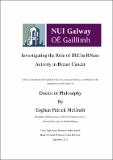| dc.contributor.advisor | Samali, Afshin | |
| dc.contributor.author | McGrath, Eoghan Patrick | |
| dc.date.accessioned | 2018-12-17T15:25:05Z | |
| dc.date.issued | 2018-12-17 | |
| dc.identifier.uri | http://hdl.handle.net/10379/14726 | |
| dc.description.abstract | Metastatic, drug resistant disease poses the greatest threat to the survival of breast cancer patients. Thus, elucidating and targeting mechanisms which govern this phenotype is a primary goal of the breast cancer field. Breast cancers manipulate cellular stress pathways to gain a survival advantage and fuel their growth. The unfolded protein response (UPR) is a major cell stress pathway responsible for the genesis and growth of many breast cancers. The most evolutionarily conserved transducer of the unfolded protein response is a protein called inositol-requiring enzyme 1 (IRE1), which is an important player in both luminal and basal-like breast cancers. Pro-tumour roles of IRE1 are mediated through its endoribonuclease (RNase) domain which has two functions, X-box binding protein 1 (XBP1) splicing and regulated IRE1-dependent decay (RIDD). In this thesis we have determined that the IRE1 RNase is particularly active in triple negative breast cancer (TNBC), a subtype with a poor prognosis and limited treatment options. We have discovered novel targets of the IRE1 RNase domain, namely C-X-C motif chemokine ligand 1 (CXCL1) which we have shown to govern a drug-resistant and stem cell-like phenotype. We also identified the first RIDD substrate in breast cancer (junction plakoglobin (JUP)) and found that its degradation by IRE1 may promote migration of TNBC cells. We employed MKC8866, a small molecule with clinical potential, to show that both of these processes can be blocked. This work highlights the promise of targeting IRE1 in the clinic to prolong and improve the lives of breast cancer patients. | en_IE |
| dc.publisher | NUI Galway | |
| dc.rights | Attribution-NonCommercial-NoDerivs 3.0 Ireland | |
| dc.rights.uri | https://creativecommons.org/licenses/by-nc-nd/3.0/ie/ | |
| dc.subject | ER stress | en_IE |
| dc.subject | IRE1 | en_IE |
| dc.subject | breast cancer | en_IE |
| dc.subject | unfolded protein response | en_IE |
| dc.subject | therapy resistance | en_IE |
| dc.subject | JUP | en_IE |
| dc.subject | Cell Migration | en_IE |
| dc.subject | Unfolded Protein Response in Breast Cancer | en_IE |
| dc.subject | Natural Sciences | en_IE |
| dc.subject | Biochemistry | en_IE |
| dc.subject | Breast cancer | en_IE |
| dc.subject | Unfolded protein response | en_IE |
| dc.title | Investigating the role of IRE1α RNase activity in breast cancer | en_IE |
| dc.type | Thesis | en |
| dc.contributor.funder | Irish Research Council | en_IE |
| dc.contributor.funder | Horizon 2020 | en_IE |
| dc.local.note | Breast cancer cells activate stress response pathways to survive environments which normally kill other cells. IRE1 is a stress response protein which is constantly active in some cancer cells, and facilitates their survival. This thesis describes new roles for IRE1 in promoting breast cancer cell migration and therapy resistance. | en_IE |
| dc.description.embargo | 2022-12-17 | |
| dc.local.final | Yes | en_IE |
| dcterms.project | info:eu-repo/grantAgreement/EC/H2020::MSCA-RISE/734749/EU/Targeting IRE1 in disease/INSPIRED | en_IE |
| nui.item.downloads | 197 | |


